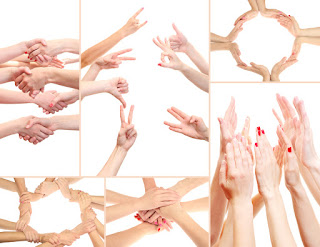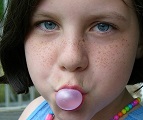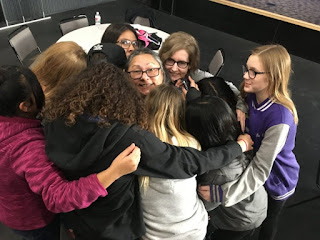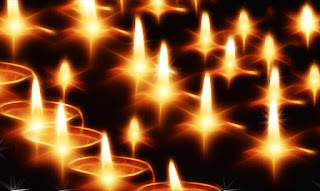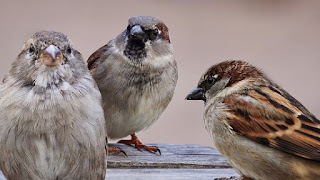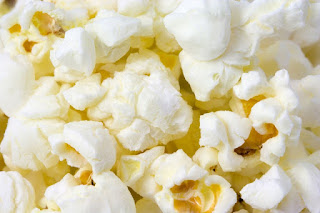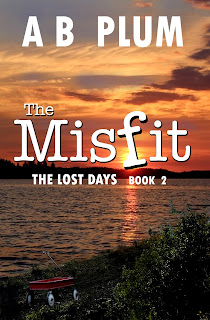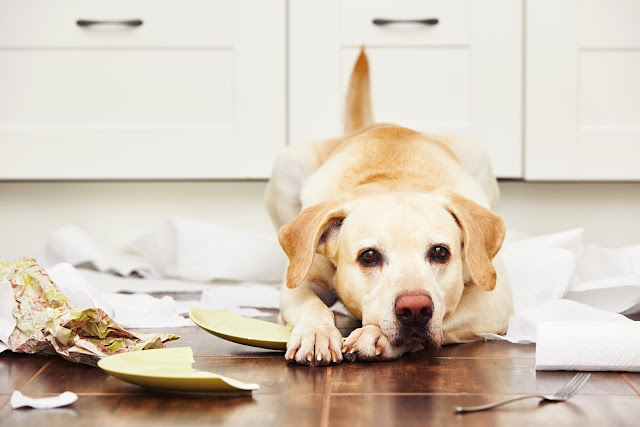WILL THE HANDSHAKE GO THE WAY OF THE ALABROSS
By AB Plum
When was the
last time you shook hands?
last time you shook hands?
BCVD?
(Before the COVID-19)?
(Before the COVID-19)?
Even before
this latest virus became pandemic, most of us shook hands almost reflexively.
We meet new people, old friends, business acquaintances, our doctors and
multitudes of others. Out come our right hands.
this latest virus became pandemic, most of us shook hands almost reflexively.
We meet new people, old friends, business acquaintances, our doctors and
multitudes of others. Out come our right hands.
Before I
broke the scaphoid bone in my right hand six months ago, I took pride in my
firm, steady grip. My high-school debate coach drummed into us—especially the
girls—how this non-verbal gesture gave us power before we ever spoke a word to
make our case. Limp, half-hearted handshakes gave our opponents one up on us,
he insisted.
broke the scaphoid bone in my right hand six months ago, I took pride in my
firm, steady grip. My high-school debate coach drummed into us—especially the
girls—how this non-verbal gesture gave us power before we ever spoke a word to
make our case. Limp, half-hearted handshakes gave our opponents one up on us,
he insisted.
And if we
lost?
lost?
Since we’d
probably meet our opponents in another debate, shake hands like a winner.
probably meet our opponents in another debate, shake hands like a winner.
Other
mammals don’t shake hands. Since they generally have an olfactory sense
superior to us, they sniff. Some anthropologists think sniffing led to handshaking.
At least one study has shown that many of us after extending our hands in
greeting, put a hand near our face.
mammals don’t shake hands. Since they generally have an olfactory sense
superior to us, they sniff. Some anthropologists think sniffing led to handshaking.
At least one study has shown that many of us after extending our hands in
greeting, put a hand near our face.
C’mon, you
say. Why not scratching our nose? Wiping our eyes? Clearing hair off our face?
say. Why not scratching our nose? Wiping our eyes? Clearing hair off our face?
Chemosensory
signaling it’s called and takes into account the above points but still
theorizes “People constantly have a hand to their face … and they modify
their behavior after shaking hands.” If you’re interested in more science
on the subject, check
here.
signaling it’s called and takes into account the above points but still
theorizes “People constantly have a hand to their face … and they modify
their behavior after shaking hands.” If you’re interested in more science
on the subject, check
here.
Etiquette
about duration, placement, who offers a hand first, too strong, too weak, men
with men, men with women, different cultures, passing on viruses—all these
factors and more lead to anxieties about shaking hands.
about duration, placement, who offers a hand first, too strong, too weak, men
with men, men with women, different cultures, passing on viruses—all these
factors and more lead to anxieties about shaking hands.
A few fun
factoids about the history of this powerful body language:
factoids about the history of this powerful body language:
When
did handshaking begin?
did handshaking begin?
No one knows for sure; the origins are
murky.
murky.
Some claim handshakes came about to
dislodge hidden weapons in the earliest times.
dislodge hidden weapons in the earliest times.
We have a visual depiction from the
ninth century B.C. between an Assyrian and Babylonian ruler.
ninth century B.C. between an Assyrian and Babylonian ruler.
Homer refers to handshakes in both the Iliad and the Odyssey.
Ancient Greek funerary vases and
gravestone showed handshakes.
gravestone showed handshakes.
Likewise, ancient Romans offered
handshakes as signs of friendship and loyalty.
handshakes as signs of friendship and loyalty.
The Quakers may have influenced giving
handshakes over bowing.
handshakes over bowing.
Victorians made the handshake popular with
manuals on the etiquette of how, when and where.
manuals on the etiquette of how, when and where.
What did one British Olympic Association’s head doctor advise athletes about handshaking in 2012?
Don’t …
shake rivals’ hands for fear of picking up a bug in the highly stressful
environment of the games and having performance adversely affected.
shake rivals’ hands for fear of picking up a bug in the highly stressful
environment of the games and having performance adversely affected.
How long was the handshake between
Donald J. Trump and Kim Jong-Un last?
Donald J. Trump and Kim Jong-Un last?
13 seconds.
What is the longest handshake recorded
(according to Guinness World Record)?
(according to Guinness World Record)?
10 hours.
Why didn’t George Washington shake
hands?
hands?
He wasn’t king, but he seemed to think nodding in public was a more appropriate behavior than the handshaking of “common” people.
What U.S. Presidential candidate studied
how to shake hands?
how to shake hands?
John F. Kennedy—ever aware of those TV
cameras.
cameras.
What Presidential candidate gave his
wife a fist bump at an election rally?
wife a fist bump at an election rally?
Barack Obama—a gesture greeted with
plenty of negative comments from TV pundits.
plenty of negative comments from TV pundits.
Conundrums
about shaking hands:
about shaking hands:
In mixed company, shake the women’s
hands first or not?
hands first or not?
What about with “seniors”? Who
initiates?
initiates?
With children, shake their hands? At
what age to begin?
what age to begin?
What about holding hands or elbows
afterward? For how long?
afterward? For how long?
What is acceptable in lieu of a
handshake? Fist bump? High-five? Wrist claps? Elbow bump?
handshake? Fist bump? High-five? Wrist claps? Elbow bump?
Given handshakes
are laboratories for germs, will they go the way of the albatross?
are laboratories for germs, will they go the way of the albatross?
***********
AB’s next
release, maybe in July, has several characters shaking hands. She’s rethinking
that body language since COVID-19 will be a part of the setting. The good news
for her is that daily solitary walks require no social interaction. Not even
with her alter ego, Barbara Plum.
release, maybe in July, has several characters shaking hands. She’s rethinking
that body language since COVID-19 will be a part of the setting. The good news
for her is that daily solitary walks require no social interaction. Not even
with her alter ego, Barbara Plum.
Read the
latest Ryn Davis mystery now available.
latest Ryn Davis mystery now available.
Check out
her website to sign up for her newsletter or
to contact her. She does reply.
her website to sign up for her newsletter or
to contact her. She does reply.

